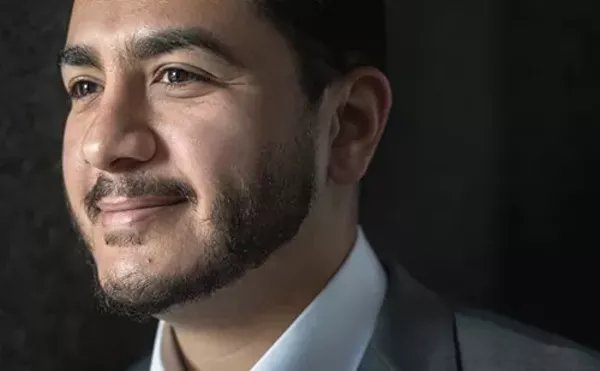
Audio By Carbonatix
[
{
"name": "GPT - Leaderboard - Inline - Content",
"component": "35519556",
"insertPoint": "5th",
"startingPoint": "3",
"requiredCountToDisplay": "3",
"maxInsertions": 100,
"adList": [
{
"adPreset": "LeaderboardInline"
}
]
}
]
If the Michigan Legislature doesn't reform the state's system for defending indigents, the federal government or the courts just might, says the guy who chairs the state House Judiciary Committee.
"It's obvious we have to do something," says Mark Meadows (D-East Lansing), who held a committee hearing at Wayne State University on Monday to discuss a new bill that would overhaul the current system. "It's not a bi-partisan issue."
In the wake of a report earlier this year from the National Legal Aid and Defender Association that ranked Michigan 44th among the 50 states in per capita public defense spending, the effort at reform is gathering speed.
Before Meadows' hearing, which was attended by about 100 people, U.S. Rep. John Conyers (D-Detroit) held a briefing for the U.S. House Judiciary Committee, which he chairs, on the same issue.
Last week, Reps. Justin Amash (R-Cascade) and Bob Constan (D-Dearborn Heights) introduced House Bill 5676, which would create a state system of public defense instead of the county-by-county arrangement that exists.
The current structure, in short, means each of Michigan's 83 counties is responsible for funding public defense in their courts, and chief judges often control how funds are spent. Large differences in funding between counties exist, says Marilyn Kelly, chief justice of the Michigan Supreme Court. Some jurisdictions are able to pay for forensic lab tests or expert witnesses, for example, while others can or do not.
"The level of justice a poor person receives is dependent entirely on which side of the county line that crime was allegedly committed instead of the facts of the case," Kelly says.
Among the problems Kelly and dozens of others described with the county-based system: judges picking defense attorneys, which can result
in, at the very least, an appearance of favoritism; unqualified lawyers; attorneys and clients meeting literally on the verge of trial or sentencing; lack of facilities where cases can be discussed; failures of overburdened attorneys to disclose potential conflicts of interest, to adequately investigate cases and to prepare for trial.
"We've been watching for 27 years no change in funding for lawyers who represent indigent defendants," says Dennis Archer, former Michigan Supreme Court Justice and Detroit mayor who moderated the U.S. House briefing.
The reform effort has wide support for its concept if not for its details. Wayne County Prosecutor Kym Worthy told Meadows' committee that she supports "about 90 percent" of the bill as it's written. "Justice has declined on both sides of the aisle," she testified Monday. "If there was an effective process then we wouldn't be seeing so many problems on the other end with wrongfully convicted people."
Meadows says the state should improve its defense system before the federal government mandates changes or the Michigan courts address the inadequacies being litigated in a pending lawsuit. Attorney General Eric Holder recently has singled out Michigan's failures in his speeches, and six indigent defendants from three counties have a case pending in Ingham County Circuit Court in Lansing. They claim the system of court-appointed counsel for defendants who can't afford lawyers denies state and federal constitutional rights to counsel and that deficiencies in funding and administrative oversight also contribute to a weak system.
Of course the question of how to pay for any reforms remains to be fully answered but Conyers said there's no question that funding could — and must — be found.
"The Constitution does not take into consideration economic times," he says.
News Hits is edited by Curt Guyette. Contact him at 313-202-8004 or NewsHits@metrotimes.com




